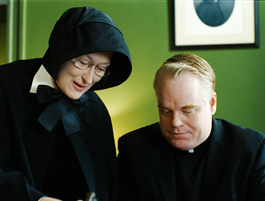home | metro silicon valley index | movies | current reviews | film review

Andrew Schwartz/Miramax Film Corp.
CAPED CRUSADER: Meryl Streep's Sister Aloysius makes it her business to bedevil Philip Seymour Hoffman's Father Brendan in 'Doubt.'
A Mighty Wind
Sister Aloysius explains it all for you in 'Doubt'
By Richard von Busack
JUICY IS the word for Doubt, though it's about as deep as a holy-water font. The film evokes the world of old-parochial-school Catholicism of 1964, in the form of a turbulent Bronx that seems as remote as Buffalo. A zitherist plays on the soundtrack at the beginning, to put you in the Third Man mood. There are so many tilted angles you wonder why the cast doesn't pitch into the walls. Director/writer John Patrick Shanley goes full gothic: storms cascading through, crows cawing on a fire escape and light bulbs that blow out because of the tension in the room. The high school with its attached convent leaks. The rain blows in. It's a classic old dark house.
The nuns do the teaching and the disciplining. Shanley makes the contrast between them and the real power at the school like something out of Potemkin. The sisters (most of them half-senile or going blind) eat dismal suppers of succotash and grisly meat. Meanwhile, the priest and his superiors guzzle Seagrams and feast on barely roasted beef, as gory as roadkill. Shanley has the confidence to play Doubt for the Sturm und Drang, as the setting for a grand diva part. The diva gets to say things like "It's my job to outshine the fox in cleverness." Meryl Streep's foxy Sister Aloysius is a flawed, sometimes fanatically eccentric detective. She can't quite nail down her case on anything more than circumstantial evidence. She believes that she is holding the line for the old virtues: opposing cough drops ("candy by another name!"), ballpoint pens (a terrible invention that destroys penmanship) and the tune "Frosty the Snowman" (it's occult).
Doubt includes an inside joke strictly for Catholics. When this formidable nun hangs a picture of the pope in a classroom. Aloysius chooses the late Pius, instead of the reformer John, an arch-conservative instead of the liberalizer. Such is the political divide between the Sister and her antagonist, Father Brendan, a popular, modern and friar-plump priest. He is played by Philip Seymour Hoffman, that Peter Lorre–worthy blend of the childlike and the sinister. Aloysius suspects the priest of taking a too-close interest in Donald (Joseph Foster), the school's only black student. The elder nun is helped in her detective work by Sister James (Amy Adams), an innocent sidekick.
The acting is theatrically grand. Streep tears into the material, and Hoffman shivers the timbers with his voice during a parable about gossip. He uses an Irish accent that, at first, seems to be comic. Then it takes an about-face into roaring seriousness. It's the kind of acting you feel in your spine instead of your brain. Later, though, it seemed that Brendan is a part that would have been better in the hands of someone sneakier. James Cromwell comes to mind. Longtime Hoffman watchers wouldn't have trouble suspecting one of his characters of pedophilia. The subject of the story is doubt, and Hoffman doesn't inspire that; he's played the bottled-up pervert so many times that we can't take his friendliness at face value.
This showcase for old-fashioned, wall-rattling thespianship works on our horror of the priestly molestation scandals, and the cover-ups that followed. Naturally Doubt deplores these betrayals. But it also deplores witch-hunting. It's not what you could call controversial. And the film is heavy on interiors. As a director, Shanley (Five Corners) opens up his stage hit into a bleak walled-in garden that ought to be too raw to sit in (and is anyway the stagiest-looking thing since Mamma Mia!). Perhaps the longest exterior is a walk out by the projects when the now celebrated Viola Davis gets her own aria, among drifts of red leaves. It's a brief moment, but a tribute to the power of catalyzing acting. Davis co-stars as the boy's mother, who is doing her best trying to play off the stacked deck handed to her.
In the kind of mystery Doubt is modeled upon, Davis' Mrs. Miller would have played her big scene in the courtroom. The conversational rhythms between Davis and Streep play just like the climax of a courtroom drama: ever shorter and more staccato sentences bouncing off each other, leading to the climax, the high note and the outburst of weeping. Fine silver tears roll down Davis' face as she tries to remind this arch-Catholic dragon Sister Aloysius of the humanist creed: everyone has their reasons. For this moment, this movie gets a little bigger than what it is: a ripping entertainment for the art-house crowd.
![]() DOUBT (PG-13; 104 min., directed and written by John Patrick Shanley, photographed by Roger Deakins and starring Meryl Streep and Philip Seymour Hoffman, plays at selected theaters.
DOUBT (PG-13; 104 min., directed and written by John Patrick Shanley, photographed by Roger Deakins and starring Meryl Streep and Philip Seymour Hoffman, plays at selected theaters.
Click Here to Talk About Movies at Metro's New Blog
Send a letter to the editor about this story.
|
|
|
|
|
|